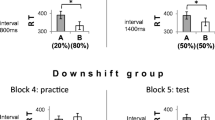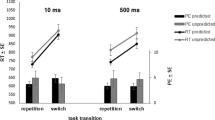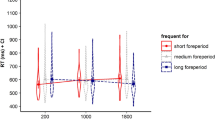Abstract
Recent research on time-based expectancy has shown that humans base their expectancies for responses on representations of temporal relations (e.g., shorter vs. longer duration), rather than on representations of absolute durations (e.g., 500 vs. 1000 ms). In the present study, we investigated whether this holds also true for time-based expectancy of tasks instead of responses. Using a combination of the time-event correlation paradigm and the standard task-switching paradigm, participants learned to associate two different time intervals with two different tasks in a learning phase. In a test phase, the two intervals were either globally prolonged (Experiment 1), or shortened (Experiment 2), and they were no longer predictive for the upcoming task. In both experiments, performance in the test phase was better when expectancy had been defined in relative terms and worse when expectancy had been defined in absolute terms. We conclude that time-based task expectancy employs a relative, rather than an absolute, representation of time. Humans seem to be able to flexibly transfer their time-based task expectancies between different global timing regimes. This finding is of importance not only for our basic understanding of cognitive mechanisms underlying time-based task expectancy. For human–machine applications, these results mean that adaptation to predictive delay structures in interfaces survives globally speeding up or slowing down of delays due to different transmission rates.



Similar content being viewed by others
References
Aufschnaiter, S., Kiesel, A., Dreisbach, G., Wenke, D., & Thomaschke, R. (2017). Time-based executive control: Expectancy in temporally structured multitasking. (submitted)
Block, R. A., & Grondin, S. (2014). Timing and time perception: A selective review and commentary on recent reviews. Frontiers in Psychology. doi:10.3389/fpsyg.2014.00648.
Block, R. A., & Gruber, R. P. (2014). Time perception, attention, and memory: A selective review. Acta Psychologica, 149, 129–133. doi:10.1016/j.actpsy.2013.11.003.
Bush, L. K., Hess, U., & Wolford, G. (1993). Transformations for within-subject designs: A Monte Carlo investigation. Psychological Bulletin, 113(3), 566–579. doi:10.1037//0033-2909.113.3.566.
Gotler, A., Meiran, N., & Tzelgov, J. (2003). Nonintentional task set activation: Evidence from implicit task sequence learning. Journal of Experimental Psychology Learning Memory, and Cognition, 10, 890–896. doi:10.3758/BF03196549.
Kiesel, A., Steinhauser, M., Wendt, M., Falkenstein, M., Jost, K., Philipp, A. M., & Koch, I. (2010). Control and interference in task switching—a review. Psychological Bulletin, 136(5), 849–874. doi:10.1037/a0019842.
Klemmer, E. T. (1956). Time uncertainty in simple reaction time. Journal of Experimental Psychology, 51(3), 179–184. doi:10.1037/h0042317.
Los, S. A., & Agter, F. (2005). Reweighting sequential effects across different distributions of foreperiods: Segregating elementary contributions to nonspecific preparation. Perception and Psychophysics, 67(7), 1161–1170. doi:10.3758/bf03193549.
Los, S. A., Knol, D. L., & Boers, R. M. (2001). The foreperiod effect revisited: Conditioning as a basis for nonspecific preparation. Acta Psychologica, 106, 121–145. doi:10.1016/S0001-6918(00)00029-9.
Los, S. A., Kruijne, W., & Meeter, M. (2014). Outlines of a multiple trace theory of temporal preparation. Frontiers in Psychology. doi:10.3389/fpsyg.2014.01058.
Los, S. A., Kruijne, W., & Meeter, M. (2016). Hazard versus history: Temporal preparation is driven by past experience. Journal of Experimental Psychology Human Perception and Performance, 43(1), 78–88. doi:10.1037/xhp0000279.
MacGregor, L. J., Corley, M., & Donaldson, D. I. (2010). Listening to the sound of silence: Disfluent silent pauses in speech have consequences for listeners. Neuropsychologia, 48(14), 3982–3992. doi:10.1016/j.neuropsychologia.2010.09.024.
Machado, A. (1997). Learning the temporal dynamics of behavior. Psychological Review, 104, 241–265. doi:10.1037/0033-295X.104.2.241.
Martinussen, M., & Hunter, D. R. (2012). Aviation psychology and human factors. Baca Raton: CRC Press.
Medina, J. M., Wong, W., Díaz, J. A., & Colonius, H. (2015). Advances in modern mental chronometry. Frontiers in Human Neuroscience. doi:10.3389/fnhum.2015.00256.
Merchant, H., & de Lafuente, V. (Eds.). (2015). Neurobiology of Interval Timing. New York: Springer.
Molet, M., & Zentall, T. R. (2008). Relative judgments affect assessments of stimulus duration. Psychonomic Bulletin and Review, 15(2), 431–436. doi:10.3758/pbr.15.2.431.
Näätänen, R. (1972). Time uncertainty and occurence uncertainty of the stimulus in a simple reaction time task. Acta Psychologica, 36(6), 492–503. doi:10.1016/0001-6918(72)90029-7.
Rieth, C. A., & Huber, D. E. (2013). Implicit learning of spatiotemporal contingencies in spatial cueing. Journal of Experimental Psychology Human Perception and Performance, 39(4), 1165–1180. doi:10.1037/a0030870.
Roberts, F., & Francis, A. L. (2013). Identifying a temporal threshold of tolerance for silent gaps after requests. The Journal of the Acoustical Society of America, 133(6), EL471–EL477. doi:10.1121/1.4802900.
Roberts, F., Margutti, P., & Takano, S. (2011). Judgments concerning the valence of inter-turn silence across speakers of American English, Italian, and Japanese. Discourse Processes, 48(5), 331–354. doi:10.1080/0163853x.2011.558002.
Rogers, R. D., & Monsell, S. (1995). Cost of a predictable switch between simple cognitive tasks. Journal of Experimental Psychology General, 124, 207–231. doi:10.1037/0096-3445.124.2.207.
Schröter, H., Birngruber, T., Bratzke, D., Miller, J., & Ulrich, R. (2015). Task predictability influences the variable foreperiod effect: Evidence of task-specific temporal preparation. Psychological Research, 79(2), 230–237. doi:10.1007/s00426-014-0550-z.
Shahar, N., Meyer, J., Hildebrandt, M., & Rafaely, V. (2012). Detecting system failures from durations and binary cues. International Journal of Human Computer Studies, 70(8), 552–560. doi:10.1016/j.ijhcs.2012.03.001.
Steinborn, M. B., & Langner, R. (2011). Distraction by irrelevant sound during foreperiods selectively impairs temporal preparation. Acta Psychologica, 136(3), 405–418. doi:10.1016/j.actpsy.2011.01.008.
Steinborn, M. B., & Langner, R. (2012). Arousal modulates temporal preparation under increased time uncertainty: Evidence from higher-order sequential foreperiod effects. Acta Psychologica, 139(1), 65–76. doi:10.1016/j.actpsy.2011.10.010.
Steinborn, M. B., Rolke, B., Bratzke, D., & Ulrich, R. (2008). Sequential effects within a short foreperiod context: Evidence for the conditioning account of temporal preparation. Acta Psychologica, 129(2), 297–307. doi:10.1016/j.actpsy.2008.08.005.
Steinborn, M. B., Rolke, B., Bratzke, D., & Ulrich, R. (2010). The effect of a cross-trial shift of auditory warning signals on the sequential foreperiod effect. Acta Psychologica, 134(1), 94–104. doi:10.1016/j.actpsy.2009.12.011.
Thomaschke, R., & Dreisbach, G. (2013). Temporal predictability facilitates action, not perception. Psychological Science, 24(7), 1335–1340. doi:10.1177/0956797612469411.
Thomaschke, R., & Dreisbach, G. (2015). The time-event correlation effect is due to temporal expectancy, not to partial transition costs. Journal of Experimental Psychology Human Perception and Performance, 41(1), 196–218. doi:10.1037/a0038328.
Thomaschke, R., & Haering, C. (2014). Predictivity of system delays shortens human response time. International Journal of Human Computer Studies, 72(3), 358–365. doi:10.1016/j.ijhcs.2013.12.004.
Thomaschke, R., Hoffmann, J., Haering, C., & Kiesel, A. (2016). Time-based expectancy for task relevant stimulus features. Timing and Time Perception, 4, 248–270. doi:10.1163/22134468-00002069.
Thomaschke, R., Kiesel, A., & Hoffmann, J. (2011a). Response specific temporal expectancy: Evidence from a variable foreperiod paradigm. Attention, Perception and Psychophysics, 73(7), 2309–2322. doi:10.3758/s13414-011-0179-6.
Thomaschke, R., Kunchulia, M., & Dreisbach, G. (2015). Time-based event expectations employ relative, not absolute, representations of time. Psychonomic Bulletin and Review, 22(3), 890–895. doi:10.3758/s13423-014-0710-6.
Thomaschke, R., Wagener, A., Kiesel, A., & Hoffmann, J. (2011b). The specificity of temporal expectancy: Evidence from a variable foreperiod paradigm. The Quarterly Journal of Experimental Psychology, 64(12), 2289–2300. doi:10.1080/17470218.2011.616212.
Volberg, G., & Thomaschke, R. (2017). Time-based expectations entail preparatory motor activity. Cortex, 92, 261–270. doi:10.1016/j.cortex.2017.04.019.
Wagener, A., & Hoffmann, J. (2010). Temporal cueing of target-identity and target-location. Experimental Psychology, 57, 436–445. doi:10.1027/1618-3169/a000054.
Watanabe, M., Hirose, K., Den, Y., & Minematsu, N. (2008). Filled pauses as cues to the complexity of upcoming phrases for native and non-native listeners. Speech Communication, 50(2), 81–94. doi:10.1016/j.specom.2007.06.002.
Weber, F., Haering, C., & Thomaschke, R. (2013). Improving the human–computer dialogue with increased temporal predictability. Human Factors The Journal of the Human Factors and Ergonomics Society, 55(5), 881–892. doi:10.1177/0018720813475812.
Wendt, M., & Kiesel, A. (2011). Conflict adaptation in time: Foreperiods as contextual cues for attentional adjustment. Psychonomic Bulletin and Review, 18(5), 910–916. doi:10.3758/s13423-011-0119-4.
Wittmann, M. (2013). The inner sense of time: How the brain creates a representation of duration. Nature Reviews Neuroscience, 1(3), 217–223. doi:10.1038/nrn3452.
Zentall, T. R., Weaver, J. E., & Clement, T. S. (2004). Pigeons group time intervals according to their relative duration. Psychonomic Bulletin and Review, 11(1), 113–117. doi:10.3758/bf03206469.
Author information
Authors and Affiliations
Corresponding author
Ethics declarations
Ethical standards
This research was supported by a Grant within the Priority Program, SPP 1772 from the German Research Foundation (Deutsche Forschungsgemeinschaft, DFG), Grant no. TH 1554/3-1.
Conflict of interest
The authors declare that they have no conflict of interest.
Studies involving human participants
All procedures performed in studies involving human participants were in accordance with the ethical standards of the institutional and/or national research committee and with the 1964 Helsinki declaration and its later amendments or comparable ethical standards.
Informed consent
Informed consent was obtained from all individual participants included in the study.
Rights and permissions
About this article
Cite this article
Aufschnaiter, S., Kiesel, A. & Thomaschke, R. Transfer of time-based task expectancy across different timing environments. Psychological Research 82, 230–243 (2018). https://doi.org/10.1007/s00426-017-0895-1
Received:
Accepted:
Published:
Issue Date:
DOI: https://doi.org/10.1007/s00426-017-0895-1




